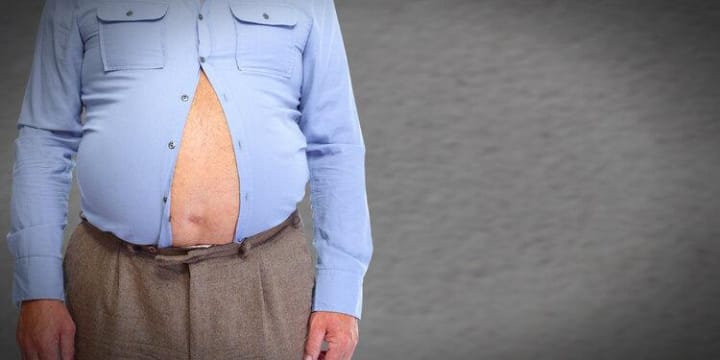After the age of 60, the elderly slightly fat will be better, do you agree?
The elderly slightly fat, or can live longer

Xiaoyi accompanied her grandmother to see her health last week, the doctor said everything is fine, but the body is a little fat, and this may continue to get high blood pressure, or even diabetes, so it is recommended that the grandmother can lose weight. However, the grandmother felt that fat is "blessed", the elderly thin can not carry a few diseases, and the doctor's advice is not thought.
"It's hard to buy old age with a thousand dollars", "Fat is bliss", "Too thin is easy to be malnourished" ......
Older people love to maintain their health, and naturally pay more attention to their weight, but what kind of weight body is considered healthy? How to determine whether your body meets the standard? After reading the article, perhaps you will have the answer.

A. "Thousands of gold can not buy old to be thin", or a misconception
With the improvement in living standards, many older people worry about over-nutrition and obesity, thus inducing "three high" and other health problems, so desperately want to make themselves thin. I do not know, with the increase in age, the incidence of malnutrition in the elderly also increased, if at this stage also blindly pursuing thin, is likely to bring a series of health problems.
First of all, the elderly over the pursuit of thin may bring the problem of sarcopenia. "sarcopenia" is a disease of the elderly with a high rate of occurrence, leading to falls, fractures, and immune function decline, seriously endangering the health and quality of life of the elderly.
Second, the pursuit of thinness in the elderly, usually using diet control to achieve the goal. Long-term small meals, meat, and vegetables are not reasonable, they will easily lead to malnutrition, and malnutrition on the health of the elderly is a systemic hazard.
In addition, the elderly being too thin will make the body's resistance decline, easy to suffer from a variety of infectious diseases, especially respiratory diseases; or make the original disease treatment effect reduced, and in serious cases even aggravate the disease.
It can be seen that, with the growth of age, the elderly should pay more attention to the rational design of the diet, precise nutrition, not being too thin, or Ken it "can not carry the disease".
Second, the elderly are slightly fat, or can live longer
The World Health Organization recommends that the BMI of healthy people is best maintained between 20-25. But, for different age groups of people, the standard of healthy weight or not the same.
European scientists have found that there is a "U" shaped curve between weight and mortality. The lowest point of the curve is the lowest mortality weight value, this value will change with age.
Specifically.
① For people under 60 years old, the mortality rate is lower if the weight is kept within the normal range (i.e., BMI between 18.4 and 24.9 is appropriate).
②People over 60 years of age: those with a BMI in the overweight category (i.e., BMI between 25 and 29.9) have the lowest mortality rate, even 6% lower than those with a standard BMI (i.e., between 18.4 and 24.9).
Therefore, it is now believed that the elderly may be better able to live longer if they maintain their weight at a "slight" level.
Note: BMI = weight (kg)/height (m)², you can test yourself according to the formula to see if you are in the healthy weight range.
To maintain a healthy weight, a reasonable diet is a foundation. Older people can eat more protein-rich foods, including white meat, eggs, beans, fish, and seafood. In addition, more participation in leisure activities, proper exercise, and active integration into society is beneficial for the elderly to maintain their physical and mental health.
Third, the elderly want to live a long and healthy life, but also to avoid the 4 "health" misconceptions
Myth 1: Eat protein powder to enhance immunity
The so-called "protein powder", whose main component is a certain type of protein, its main purpose is to supplement protein for those who do not have enough protein. Excessive protein intake has adverse effects on the human body and can lead to complications such as hyperuricemia, metabolic acidosis, and osmotic diuresis.
Older adults who need protein supplementation should first encourage themselves to eat 50 grams of lean meat, 1 egg, 1 bag of milk (250 ml), and 50 grams of tofu daily. If you need additional protein powder, you should first go to the hospital for an examination and be guided by your doctor to consume it.
Myth 2: You can't eat egg yolks, you will have high blood lipids
Laboratory tests show that egg yolk is rich in lecithin, which is a strong emulsifier that makes fat and cholesterol particles extremely fine and becomes microscopic particles suspended in the blood so that they can pass through the blood vessel wall smoothly and be fully utilized by cells, thus not increasing serum cholesterol and blood lipids.
In addition, Japanese neurologists have found that the rich lecithin in egg yolks can be converted into acetylcholine in the brain, which is the nemesis of Alzheimer's disease. Therefore, eggs are the ideal nutritional food for people with memory loss, and normal adults and elderly people have no problem eating one egg per day.

Misconception three: the earlier the morning exercise, the better
Many elderly people are accustomed to the sun having just risen to exercise, and that the earlier the better. In fact, at this time, the light is dark, is not conducive to identifying the feet and the surrounding environment, prone to tripping, scrapes, and other accidents. In addition, the elderly have poor blood circulation, coupled with the morning after the blood viscosity is high, prone to sudden cardiovascular disease, so the elderly themselves suffer from cardiovascular disease and is more unsuitable for early morning exercise.
Myth 4: There is no need to fill teeth when you are old
Some elderly people think that when they are old, it is normal to have a few missing teeth. Always empty without filling the teeth. But this continues to be harmful, with missing teeth, and rotten teeth that are not filled, which will significantly reduce chewing ability, affecting digestion and nutrient absorption. In addition, one or two missing teeth will lead to uneven stress on the whole row of teeth, and the chance of decay, loosening, and loss of surrounding teeth will increase, which will further affect the intake of nutrition for the elderly.
Finally, Ai would like to remind everyone that there is nothing wrong with paying attention to health but avoiding going into the wrong area. Daily eating, drinking, sleeping, and pulling may seem simple, but how to achieve the purpose of health through daily habits requires scientific knowledge and the motivation to persist.






Comments
There are no comments for this story
Be the first to respond and start the conversation.